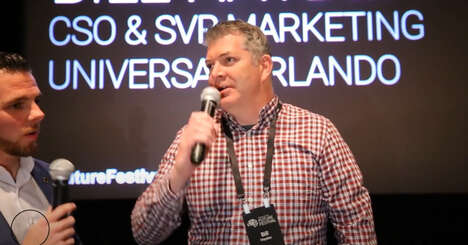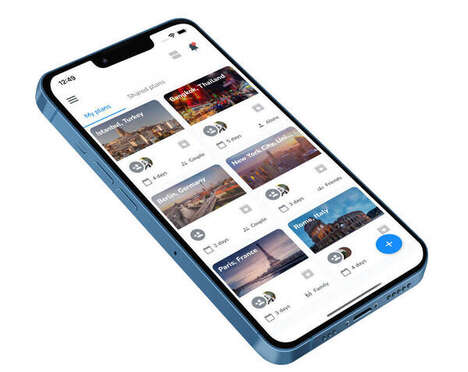Solution-Based Innovation
An Interview with Bill Hayden, Chief Strategy Officer & EVP Universal Parks & Resorts
Related Trend Reports
AI, Boomers, Computers, Drinking, Food, Gadgets, Games, Hip Hotels, Life Stages, Lifestyle, Mobile, Seniors, Tech, Travel, World Believing that true innovation means creating solutions rather than just identifying challenges and opportunities, Bill Hayden is Universal Parks & Resorts' Chief Strategy Officer & EVP. Bill is dedicated to putting the voice of consumers front and center and stresses that the path to a company's success is never a linear one.
Believing that true innovation means creating solutions rather than just identifying challenges and opportunities, Bill Hayden is Universal Parks & Resorts' Chief Strategy Officer & EVP. Bill is dedicated to putting the voice of consumers front and center and stresses that the path to a company's success is never a linear one. 1. How does your team generate new ideas?
The first thing we like to do is listen to the voice of the customer. I think it's very unique and interesting that this strategy functions like mine, in the Marketing and sales Department of Universal Orlando.
In the marketing group, we really are putting the voice of the consumer front and center in regards to what we're trying to do. We're not just generating ideas internally, but are really going after how we’re going to understand what a consumer is.
One of the things we love to do is creating kind of like a raw video. We're very fortunate to have a media center in the park and we have probably one of the best demographic cross-sections of Americans you could ever get around the world that are walking through our park every day, So we like to just put these folks in the center or do surveys and get their voices before we start making decisions. We really ask more general questions about how they think or what they're doing with their family. We’re also curious about how they enjoy themselves and really get at that rather than putting specific ideas in front of them that are maybe driven by our biases already.
2. From a barriers perspective, what are some of the major barriers to innovation in your world?
I think one of the big things we see is kind of like the tyranny of the urgent. We all have a million things to do every day and we are all really focused on getting those things done that are most urgent in front of us. In doing that, we kind of lose what’s important. So I think one of the things we like to do and what I like to do as a leader is to give permission and help with prioritization. I really want to help people understand that it's not just doing what's most urgent in front of you, but about making sure you're making time for the important things.
The other thing I think that really hurts or bothers me is a buried interview. Innovation is biased of course. But I think a lot of the stuff we've been hearing today talks about filtering, right? It's all about the Internet of Things and really simple ways of filtering stuff out. But I think most of us in the business world or in the world today are getting filtered sources or information that we wind up making decisions with that are similar to decisions we've already made or decisions that are in our peer group or our current customers.
And how to innovate is to think about people that you're not thinking about. But all the various filtering mechanisms, I think, really put you in an echo chamber and keep listening to what you're already doing so I think it's really important to invite other people in to share stuff as broadly as possible with as broad of a group as possible. You have to make sure that you're getting a different perspective from customers, employees and partners, and even looking across other industries because they’re going to break you out of your echo chamber, your filtered information stream and help you make different decisions.
3. How do you identify trends? What resources or strategies do you use?
What is this company called? Trend Hunter? They're like, really good (laughs). But seriously, Trend Hunter is one of the best ways we've been finding trends. It’s been really valuable for us over the last couple of years as a client, and we believe that you have to be an insatiable consumer of content. The only way to do that is to really be sure you’re casting your net as wide as possible.
We're all too busy and we're all time starved and attention deficit starved, as we saw earlier in some of the presentations. And so if you do that, you can't just have one or two people thinking about things. You can't have a smart person or a smart group of people going out doing things. You really need to think in depth about crowdsourcing it, if you will and tapping into everybody.
We do a lot of stuff in our company where I think we tap into the broader group of really getting access to those ideas and those thoughts that don’t just belong to a specialty group. And to me, that will help anyone overcome that barrier – the bias and the attention and the ability to put time on it. If you can grab five percent of everyone's time, not only do you get a much broader group and much more time spent on innovation, but you also get a lot more new ideas and new perspectives rather than staying in your echo chamber.
4. Do you have any rituals for resetting to be creative? What are some of them?
Most of your corporate meetings, business meetings and especially executive boardrooms are full of people who built their career in finding the problems with other people's ideas and identifying the challenges that are out there. So when people on my team bring concepts or concerns, I tell them they’re not allowed to leave without a solution.
What I always tell them is that they’re telling me a piece of data or an insight and we're all drowning in those. Don't bring me an insight, bring me an insight with a potential solution because I don’t want you to bring me a problem or an opportunity. I instead want you to make that extra step and that’s one of our rituals. You really want to consider what drives you to action and gets you out of the thing where you're just managing to continually find challenges and problems while never being part of the solution.
5. One of the things you mentioned earlier was looking at adjacencies, right? Could you ground that for us and talk about an instance where you've adopted an innovation from another industry?
There's various things that come to mind when I think about that. One of the things we like to do is look at our particular spot in our industry. We're a very consolidated industry, and everyone in Orlando knows there are probably three or four people making waves in our business, and this can lead you to get caught in an echo chamber.
What we do is look at other businesses and specifically look at folks who are facing the business challenges we're facing and while trying to learn from those. Famous brands come to mind like a Target or an Apple, so any market leader in a market that’s very dominant and competitive.
We’re fortunate to be a part of a big company in Comcast and NBC Universal, so we have built infrastructures across our business to be able to tap into subject matter experts. We work a lot through projects like Symphony and others, so I think you should look at brothers and sisters in your corporation if you happen to be part of a bigger group. If not, definitely look outside rather than inside your own industry and look to businesses whose challenges look like your challenges.
6. You talked about some tactical things, but obviously as a leader, you're also tasked with facilitating innovation or a culture of innovation. How do you go about that or how do you think about creating a culture of innovation?
Firstly, it’s important to remember that you’re no longer going to just be thinking of challenges, opportunities, problems, issues or data but rather that you're going to think about a solution to them. If you're solution focused, you can really get to that much more significantly.
The other thing that's important is access to the hive mind of the entire organization. We do this great thing my boss puts us on called the Universal University. Many companies will say you can go to this training and you can go to this conference and you can do this or that. The very fact that we have 26 people here shows what we do, but what we do is actually bring in high level speakers and we invest in this initiative as a company. We bring speakers in to present to the entire marketing and sales teams along with broader departments.
So rather than having an insightful speaker or having three people go off, hear it, and bring it back to their team, you're now getting hundreds and hundreds of people participating and tapping into their inspiration. I think that commitment and investment in your employees is something that really embodies the idea that everyone’s job is to be an innovator every day. It's not just to come in and do what I do every day.
7. Last question. I want you to describe the future. What do you think your industry will look like in ten years?
In the year 2027? Well, a smart company once told me, if I want to think about ten years from now, you should think about 20 years from now. And then imagine it'll come twice as fast as we thought. It was very good advice. A couple of things come to mind when I think about where we're going in the future. I think one of the key things we're going to have to really get a handle on is this idea I call inherent customization.
Right now, every company here is probably asking their customers or potential customers to fill out a profile, to give them information so that they can be customized to. And I think the expectation in everything from online interactions to your theme park experience is going to be something that is much more about the experience.
80% of people said that the most common thing they want to talk about is themselves and this is the perspective that's growing up that way. I think it’s important to understand how that inherent customization is going to be delivered. Right now, in the theme park or hospitality industries, you spend a lot of time driving towards efficiencies to deliver similar experiences to large groups of people in a way that can deliver that consistency and great experience.
When you look at Gen Z and the folks that are coming up, they're not going to want the same experience as everyone. They're going to want their own perfect little snowflake experience. They’re really going to figure out how you can mass produce and customize physical and personal experiences using all the information you're able to gather.
I think the one other thing that is really important for everyone to think about is to get out of this idea that the world works in a linear way or model. Much of what we heard today is that we're in a networked world where things are going in many different directions at once. There’s no single straight direction and no solution or idea is going to work that way. Again, I think the members of Gen Z are just inherently network thinkers. We laugh about their 8/2 attention span but just how they’re growing up, and we're going to have older generations learning to think about success in a networked world – both from the models we build to our communications we make.
We're going to focus on this. And I think the world is like that today, and consumers are like that. The linear is just going to go ahead and make you obsolete, and we need to figure out how to create a networked way of communicating and delivering whatever product or experience you offer to them.
References: universalorlando
Featured Articles

Recycled Hotels
Hotels incorporate recycled materials into their designs and operations

Senior Metaverse
Companies are leveraging virtual reality to enhance elderly peoples' daily lives

AI Travel
AI-based travel-planning apps take some of the work out of traveling

Web3 Tourism
The travel industry is beginning to integrate aspects of a decentralized Internet

Indulgent Hotel
Hotels are creating extravagant food and beverage experiences for guests

Hybrid Event
Corporate and work-related events are made easier with hybrid programs